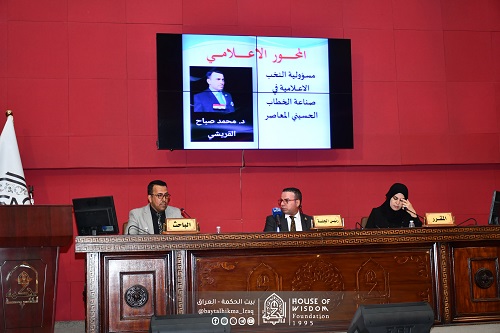|
The Unseen and Unspoken in the Revolution
2025-08-03

Whoever Does Not Join Us Will Not Attain Victory" — A Scholarly Seminar at Bayt al-Hikma on the Hussaini Revolution
The Center for Cadres and Elites for Studies and Research (Maknakum), in collaboration with the Islamic Studies Department at Bayt al-Hikma, held a scholarly seminar titled “Whoever Does Not Join Us Will Not Attain Victory: Elite Insights on the Hussaini Revolution” on Sunday, August 3, 2025, at Al-Khwarizmi Hall in Bayt al-Hikma.
The session was chaired by Dr. Jamal Saray, Head of the Center for Cadres and Elites, with Dr. Mayyas Diaa Baqir, Head of the Islamic Studies Department at Bayt al-Hikma, serving as session moderator.
The seminar addressed the significance of Imam Hussain’s (peace be upon him) revolution as a genuine standard of triumph, emphasizing that true victory lies in adhering to justice and moral principles rather than superficial conquest. Those who fail to follow this path, the speakers asserted, forfeit the honor of eternal victory—one rooted in values, dignity, and truth.
The seminar featured two key themes:
1. The Islamic Dimension, presented by Dr. Riyadh Sajet from the College of Islamic Sciences, under the title: "Strange Structures in the Tragedy of Karbala: An Analytical Study of the Catastrophic Events of Al-Taff." His presentation explored the recurring emotional and tragic motifs in the narrative of Karbala. Dr. Sajet highlighted overlooked dimensions of Imam Hussain’s movement, including political preparations, reformist discourse, opposition to dynastic rule, and the vital role of women—especially Lady Zainab (peace be upon her)—both before and after the battle.
2. The Media Dimension, presented by Dr. Mohammed Sabah Al-Quraishi, was titled: "The Responsibility of the Media Elite in Shaping the Contemporary Hussaini Discourse." He argued that the Hussaini discourse is not merely a retelling of historical events, but a living reformative project. He emphasized that media professionals bear the responsibility of presenting this discourse in a language that resonates with contemporary challenges—transforming it from a traditional message to a dynamic one through platforms such as public sermons, lectures, satellite channels, and digital media, all while preserving its core values.
The seminar witnessed vibrant engagement from participants, including researchers and academic experts, who enriched the discussions with their questions, feedback, and commentary.
Among the attendees was Dr. Raed Akla Al-Zaidi, member of the Board of Trustees at Bayt al-Hikma.
|